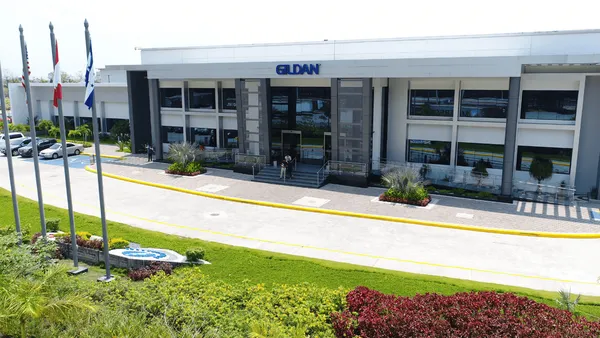UPDATE: October 30, 2018: About a month after J.C. Penney announced the departure of its chief financial officer and the appointment of an interim CFO, the retailer has named yet another temporary finance chief. The company said in a press release Monday that Michael Fung would take over the interim CFO spot from Jerry Murray, effective Tuesday. Murray was appointed interim CFO after Jeffrey Davis left the company Oct. 1 for Qurate Retail Group. With the latest reshuffle, Murray is set to return to his position as senior vice president of finance as Fung takes over the CFO spot. Fung previously served as temporary CFO for Neiman Marcus Group and 99 Cents Only Stores, both of which have recently gone through leadership transitions and grappled with distressed balance sheets.
Dive Brief:
- J.C. Penney Chief Financial Officer Jeffrey Davis is leaving the department store retailer, effective Oct. 1, to "pursue another opportunity," the company said in a release Thursday. A Penney spokesperson told Retail Dive the company could not disclose more information about Davis' plans.
- Jerry Murray, senior vice president of finance, will take over the position as interim CFO as Penney conducts a formal search for a permanent finance chief.
- Murray began at the retailer in February of 2016 after serving as CFO for multimedia marketing firm Valassis, according to the release. In the interim CFO role, he will report to certain members of the office Penney set up to carry out the duties of CEO following the departure of Marvin Ellison in May. Those members are Therace Risch, chief information and digital officer, and Mike Robbins, executive vice president of private brands and supply chain.
Dive Insight:
Davis is the third major executive to leave Penney since May, along with Ellison and former Chief Customer Officer Joe McFarland, who left in July to join Ellison at Lowe's as executive vice president of stores. That's one more slot the company's board will need to fill as it tries once again to reset its position in the department store space.
The sector has made strides since last year, but J.C. Penney has not kept pace with its better-performing competitors, such as Kohl's and Macy's. In the second quarter, Penney's sales fell 7.5% year over year, its net loss doubled and its comparable sales barely budged. Executives blamed surplus inventory and markdowns as it tried to adjust its approach to inventory management.
At the time, Davis laid out in an analyst call a new approach to "rightsize" its inventory. The problem was, Penney had already been making moves to slash inventory and shake up its assortment in past quarters, all of which has led to losses at the retailer. Some analysts and observers look at Penney and see a retailer that doesn't know what it wants to be or where it wants to play.
Penney also long ago tied its fate to the suburban mall, which has been continually declining for decades. "I just don't see a strategy that makes them relevant," Nick Egelanian, president of retail development consultants SiteWorks International, told Retail Dive earlier this year. "If they had a chance of not making themselves obsolete, that chance came 30 years ago."
Whoever steps permanently into the CFO spot will have plenty of work to do. The company carries nearly $4 billion in debt. In Q2, it paid $79 million in interest while operating at a $36 million loss.
Analysts at Moody's and S&P Global separately downgraded the retailer in August citing uncertainty over the retailer's turnaround efforts, especially after the departure of Ellison. S&P analysts at the time wrote specifically that there was "heightened risk that operating performance will not stabilize over the next 12 months due to further operational setbacks, and uncertainty around the company's strategy and path forward under new leadership."
"JCP has continued to significantly underperform our expectations despite a leaner store fleet (JCP closed 141 stores in fiscal 2017) and repeated efforts in previous quarters to right-size inventory," the analysts wrote.













